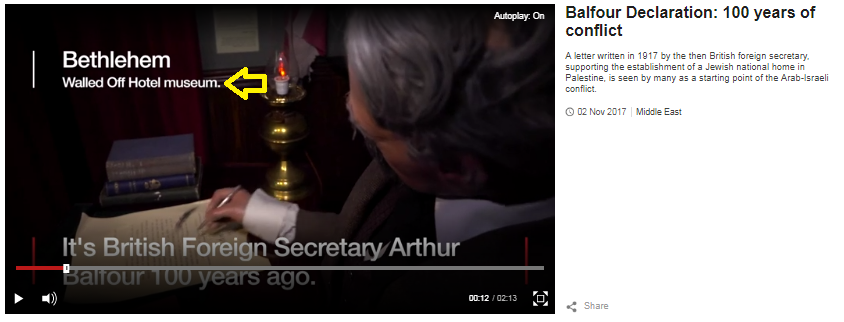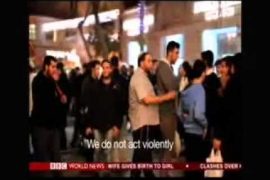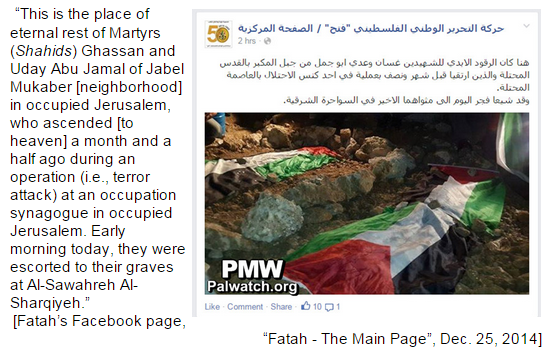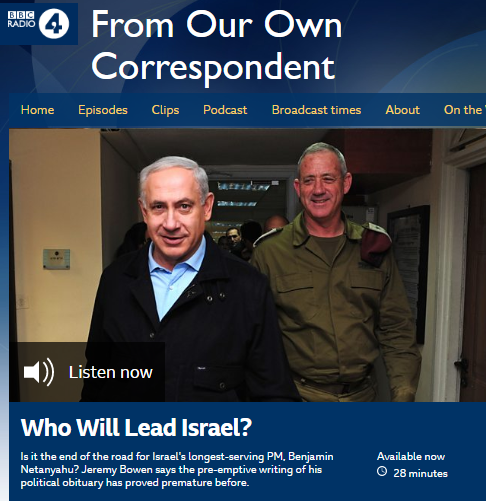A filmed report by the BBC Jerusalem bureau’s Yolande Knell that appeared on the BBC News website’s Middle East page on November 2nd under the headline “Balfour Declaration: 100 years of conflict” opened with footage filmed in what is inaccurately described as a “museum”.

In fact, that footage was filmed in the same place as two additional reports appearing on the BBC News website’s Middle East page on the same day: a location previously correctly described by the BBC as “a political statement”.
The report opens:
“This exhibit shows the signing of a controversial letter which helped transform the Middle East. It’s the British Foreign Secretary Arthur Balfour 100 years ago.”
Yolande Knell: “And this is actually the same declaration over here and then this is the key bit where it says that the government views with favour the establishment in Palestine of a national home for the Jewish people. But at the same time, nothing shall be done which prejudices the rights of existing non-Jewish communities.”
“It meant, for the first time, official recognition for a Jewish homeland.”
Knell’s lax paraphrasing of the wording of the Balfour Declaration fails to clarify to viewers that it specifically referred to “the civil and religious rights of existing non-Jewish communities” rather than “rights” in general.
There is of course a third part to the Balfour Declaration: “nothing shall be done which may prejudice […] the rights and political status enjoyed by Jews in any other country”. As has been the case across the board in the BBC’s ample coverage of the Balfour Declaration centenary, viewers of this report were not told of the existence of that part of the document or of the ancient Jewish communities subsequently forced out of Arab and Muslim lands.
Following archive material, the film continues with some specious history that fails to clarify the Ottoman Empire’s role in the First World War or the fact that British control over the region was achieved through military action.
“During WW1, the Ottoman Empire collapsed and Britain took control of Palestine. It had a large Arab majority but the Jewish population was growing. When Lord Balfour visited in 1925 Jewish residents welcomed him warmly. The Balfour Declaration is now seen as a major step in creating the modern state of Israel in 1948. Balfour’s text was deliberately ambiguous. But Palestinians are taught that it sowed the seeds of their long-standing conflict with Israel.”
That conflict of course began well over two and a half decades before Israel came into existence but the BBC avoids portraying it as being rooted in anti-Jewish violence.
Viewers are told that:
“The current Lord Balfour takes a special interest in the Middle East and in this centenary.”
Lord Balfour: “I think we should commemorate it rather than celebrate it. I don’t think we can celebrate while we have this friction.”
The film closes with promotion of the PA/PLO’s chosen narrative concerning the centenary.
“Now the Israeli prime minister has been invited to London for the anniversary of the Balfour Declaration. Palestinians are angry. They feel the UK owes them an apology for what they see as an historical injustice. The UK has rejected the call, saying it will mark the occasion with pride.”
Once again we see that the BBC’s ample coverage of the Balfour Declaration centenary is focused on amplifying Palestinian messaging on the topic.
Related Articles:
BBC’s Bateman amplifies PLO’s Balfour agitprop
More Balfour Declaration agitprop promotion on the BBC News website
Multiplatform BBC amplification for anti-Israel ‘political statement’ PR campaign




